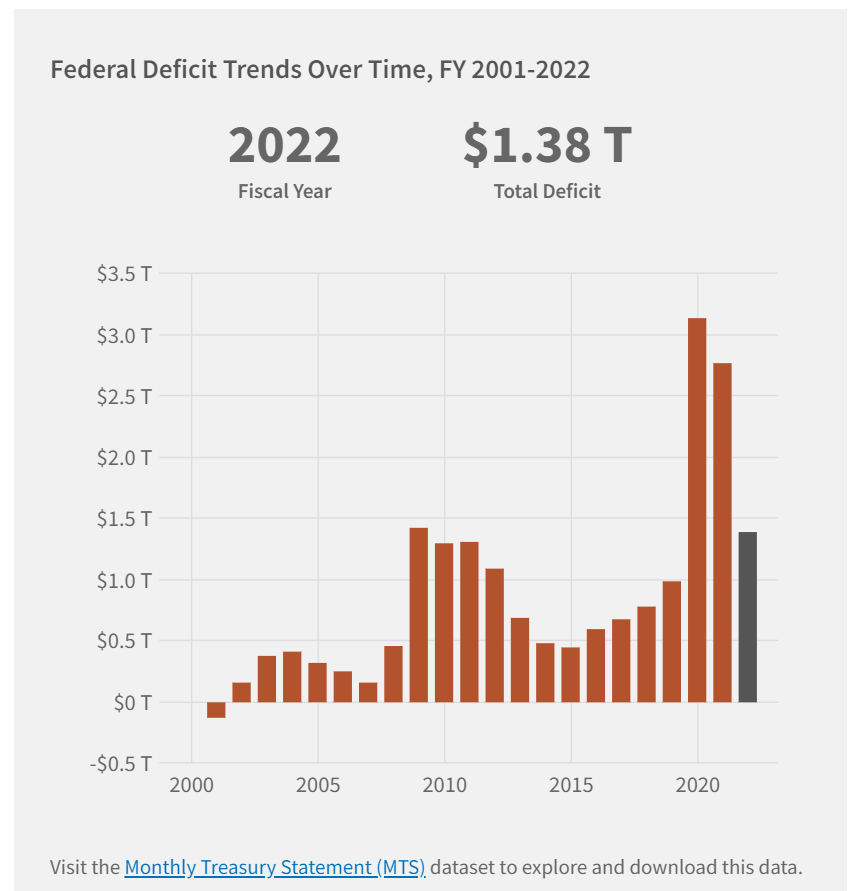[ad_1]
At times last summer, it seemed like the only thing President Joe Biden wanted to talk about was the federal budget deficit.
“We’re on track to cut the federal deficit by another $1.5 trillion by the end of this fiscal year. The biggest decline ever in a single year, ever, in American history,” Biden claimed during a May 2022 press conference. Later that same month, in a Wall Street Journal op-ed touting his economic program, Biden wrote that the deficit would fall by $1.7 trillion and repeated the “largest reduction in history” claim. That talking point was still getting heavy rotation in September when the president bragged on 60 Minutes about his deficit-cutting powers.
And this wasn’t Biden shooting from the hip. It was a clear messaging strategy from the White House’s communications apparatus, which pushed out “fact sheets” to reporters and shareable graphics on social media emphasizing the apparently falling budget deficit.
Today’s Congressional Budget Office report projects that this year, the deficit will fall by $1.7 trillion — the single largest reduction in the federal deficit in U.S. history. pic.twitter.com/o3UjYwOKZt
— The White House (@WhiteHouse) May 25, 2022
Of course, as Reason (and other outlets) clarified, the falling deficit was not the result of anything the president had done. There had been an unprecedented amount of federal spending in 2020 and 2021 due to the COVID-19 pandemic, and that spending drove the budget deficit to record highs: over $3.1 trillion in 2020 and more than $2.7 trillion in 2021.
Compare this chart, from the Treasury Department, with the misleading one the White House shared on Twitter, to understand the subterfuge:

As the pandemic passed and federal spending returned to more normal levels, so did the annual budget deficit. (In fact, the deficit would have fallen further last year if not for Biden’s policies, thanks to things like the infrastructure bill and last year’s federal budget.)
Anyone knowledgeable about the federal budget or capable of reading a Congressional Budget Office (CBO) report could have told you that last year’s $1.38 trillion deficit—the largest in more than a decade, if you ignore the two pandemic years—was not actually an indication that the federal deficit was shrinking. The White House has lots of people like that working for it, but the Biden administration chose for political reasons to push a different narrative, a false one, that ignored important context and relied on misleading statistics.
So how’s the budget deficit looking after the first three quarters of the current fiscal year? “The federal budget deficit was $1.4 trillion in the first nine months of fiscal year 2023,” the CBO reported last week. That’s “$875 billion more than the shortfall recorded during the same period last year.” The CBO projects that the deficit will ring in around $1.5 trillion when the current fiscal year wraps up on September 30.
Funny that Biden doesn’t want to talk about that.
It’s less funny that he’s also ignoring the trajectory of the federal deficit in future years. Rather than shrinking, the gap between federal revenue and federal spending is on course to widen dramatically in the coming decades. That means the federal government will have to take on more debt, and the rising cost of that debt will “slow economic growth, drive up interest payments to foreign holders of U.S. debt, elevate the risk of a fiscal crisis, increase the likelihood of other adverse effects that could occur more gradually, and make the nation’s fiscal position more vulnerable to an increase in interest rates,” the CBO warned last month.
Tellingly, Biden has opposed the two small steps that have been taken toward shrinking the deficit so far this year.
First was the passage of the debt ceiling deal, which included some discretionary spending caps that will marginally reduce future budget deficits. Biden successfully blocked a House Republican attempt to impose stricter spending caps as part of that deal and refused to include entitlement spending—the real driver of long-term deficit growth—in the negotiations.
Then came the Supreme Court’s decision to strike down Biden’s expensive student loan forgiveness plan. That ruling will reduce the 2023 deficit by about $400 billion, according to estimates by the Committee for a Responsible Federal Budget, a nonprofit that advocates for reducing deficits.
Strangely enough, the collapse of Biden’s student loan forgiveness scheme might cause this year’s budget deficit to fall slightly lower than last year’s, which Biden had been so eager to brag about. (In last week’s update on the deficit, the CBO said it was unsure about that because the administration is still trying to push through another expensive student loan policy that will allow borrowers to make smaller payments.)
That ought to prove that all the talk about deficit reduction was merely political opportunism for the president. Biden was eager to take credit for a falling federal deficit that had nothing to do with his policies, but he has no apparent interest in the difficult tradeoffs that will be necessary to actually curb the federal government’s addiction to debt.
[ad_2]
Source link
